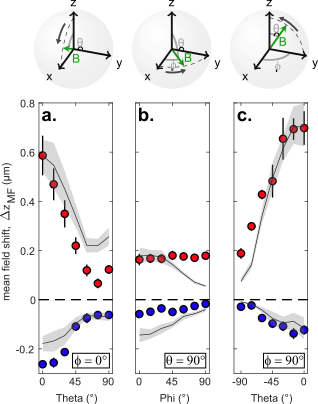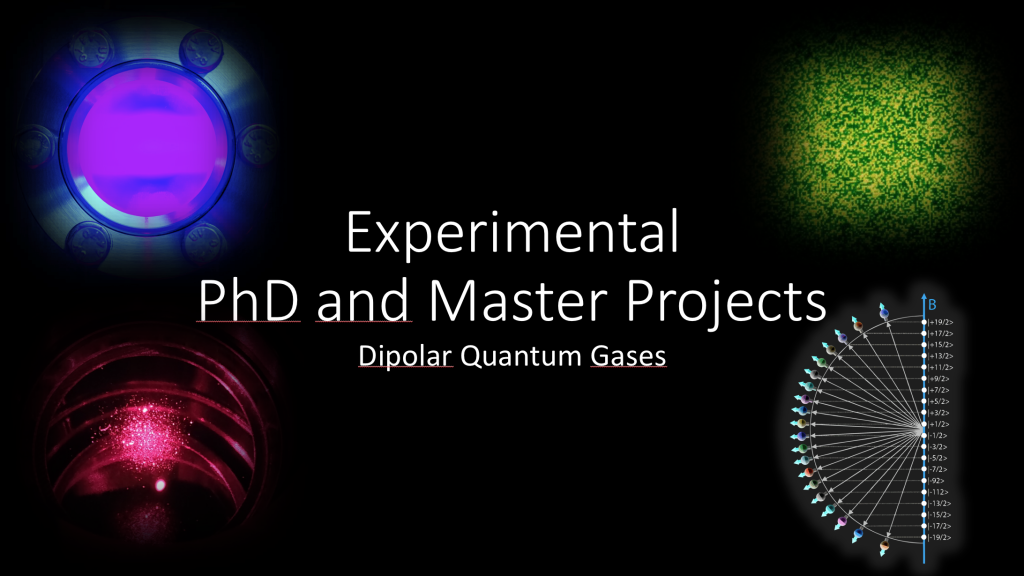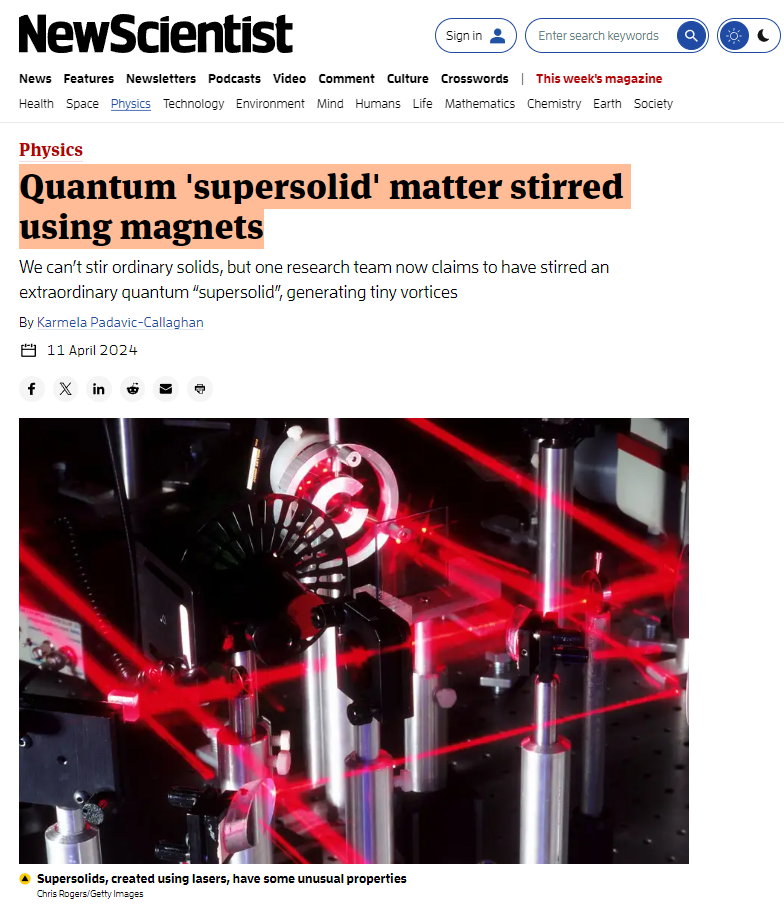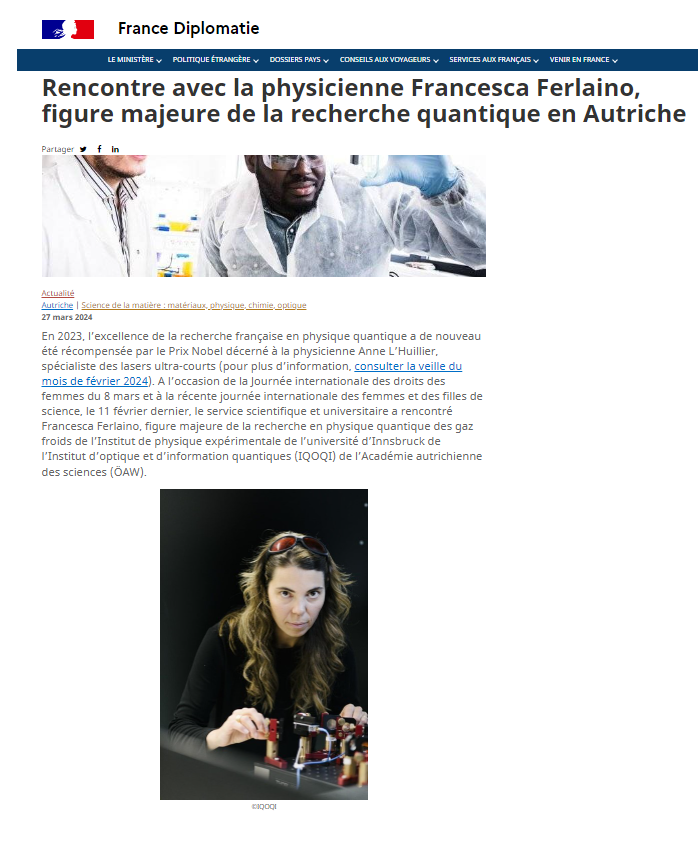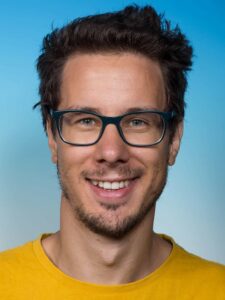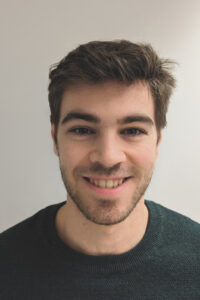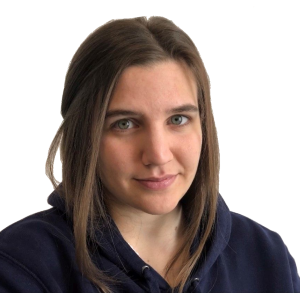
Aurora Program for Master and PhD students
Apply now for the Aurora excellence fellowship program for visiting Master and PhD students! Travel expenses and accommodation will be fully covered. More information in the “Openings 2026” menu.

Welcome to the Quantum World!
Our group travelled to the Vienna City Hall for “Willkommen Quantenwelt” celebrating 100 years of quantum science. Thanks to Quantum Science Austria and collaborators for organizing this fantastic event!

2025 Group Openings!
We are happy to announce that our dipolar quantum gas group has an Academy Scientist + Postdoc and PhD positions open for 2025!

“Dance your PhD 2025” contest by Science and AAAS
Congratulations to our PhD student Arfor, who turned our research topics into a dazzling music video!

Vortices in a supersolid
2024’s Biggest Breakthroughs in Physics: Our research on the observation of vortices in a dipolar supersolid featured by Quanta magazine!

Austrian of the Year 2024
Francesca was crowned as the ‘Austrian of the Year’ in the research category at the Austria 24 gala by Die Presse!

Summer BBQ
Our 2024 Summer BBQ took place on the 24th of June and celebrated the many different achievements of the group!

Murder Mystery Dinner
Our 2024 group dinner took place on the 18th of January at CasoinN da Giorgio restaurant, with a 1920’s Murder Mystery theme!

Glitches in supersolids: links between neutron stars and quantum matter
By emulating the connection between a rotating supersolid phase and an external solid phase, we were able to replicate “glitches” – sudden jumps in the solid angular momentum driven by quantum vortices leaving the supersolid.

Cluster of Excellence Quantum Science Austria granted
Three Clusters of Excellence in Innsbruck have been funded! With highly endowed clusters of excellence, the Austrian Science Fund FWF creates Austrian flagships of basic research. The University of Innsbruck will coordinate the Cluster of Excellence for Quantum Sciences.
Our group studies dipolar quantum gases made of Erbium (Er) and Dysprosium (Dy) atoms. These extraordinarily magnetic species are a powerful new resource for reaching quantum simulation with strong connectivity, in which each atom is coupled to the other over long distances, and exploring exotic phases of matter that have no classical counterpart.
We have four labs: the ERBIUM LAB, where Er was Bose condensed for the first time ever; the Er-Dy LAB, which studies quantum dipolar mixtures under a quantum-gas microscope; the T-REQs LAB, where we trap Er atoms in arrays of optical tweezers for Rydberg physics; and the Dy-Yb LAB, currently under construction – this new experimental apparatus will be used to study many-body phases of highly-magnetic dysprosium and of mixtures with non-magnetic ytterbium. The Theory Group completes our team studying and predicting dipolar phenomena in dipolar quantum gases and mixtures.
The group, led by Francesca Ferlaino, is jointly located at the Institute for Experimental Physics (IExP) of the University of Innsbruck and at the Institute for Quantum Optics and Quantum Information (IQOQI) of the Austrian Academy of Sciences, and it is part of the Innsbruck Center for Ultracold Atoms and Quantum Gases.
Follow our group’s updates on Bluesky  and LinkedIn
and LinkedIn  !
!
News from the labs
Now published as an editors' suggestion in PRA, we present a first study of the influence of the dipole-dipole interaction on the total inter-species interaction in our erbium-dysprosium mixture, in collaboration with M. Modugno from the University of the Basque Country.
Keep Reading ...
Our new pre-print with collaborators at ICFO, Barcelona, investigates the topological properties of the bond order wave in the extended Fermi-Hubbard model.
Keep Reading ...
It is now an exciting time to work with ultracold highly-magnetic quantum gases, thrived by the rapid developments of quantum science based on lanthanide species. We are continually searching for outstanding Master and PhD Students!
Keep Reading ...
Group news
Our latest research on the observation of vortices in a dipolar supersolid has been featured in NewScientist!
Keep Reading ...
The application deadline for the 2024 Aurora Fellowship has been extended to April 14th!
Keep Reading ...
The French Ministry of Foreign Affairs published a profile on group leader Francesca Ferlaino, Univ.-Prof. Dr., about her research, career and commitment to gender equality in Science.
Keep Reading ...
Welcome and goodbye
We bade farewell to Manfred Forstinger from the administrative staff on the 28th of February, 2024. We wish you the very best in the new chapter of your life, Manfred!
Keep Reading ...
Welcome to Unai Trujols González, who is joining Eribum lab for his Masters' internship.
Keep Reading ...
Farewell to Nefeli Ioli Sonnberger who joined the Er-Dy team for her master thesis in March 2021!
Keep Reading ...
 and LinkedIn
and LinkedIn ![]() !
!










